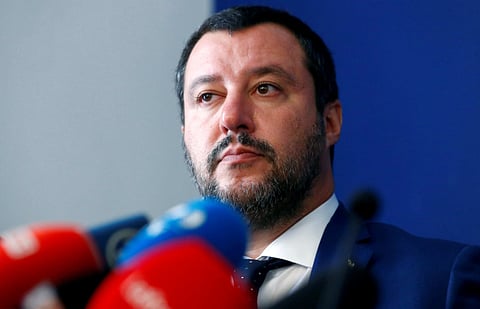Why Italy gets little respect in Europe
Rome has made an offer that Brussels can refuse when it comes to its national finances

Imagine putting the lunatics in charge of the asylum? Well, in a way, that’s what Italy’s Deputy Prime Minister Matteo Salvini, is proposing.
Come May 2019, there will a new European parliament elected from across the 27 members. And once those new parliamentarians meet in Strasbourg, they will get to approve the European Commission — the cabinet-like structure that oversees the day-to-day running of the European Union (EU).
Right now, there are 751 MEPs — members of the European parliament — and with the United Kingdom gone one way or another by March 29, there will be 705 seats up for grabs. For the record, each MEP earns €7,957 (Dh33,309) monthly and another €4,299 for monthly office expenses.
As it stands now, each of the 27 nations get to nominate one commissioner, and the rule of thumb is that the bigger and more influential the nation, the bigger the portfolio — but the appointment process also involves a lot of plain old politicking, glad-handling and back-room wheeling and dealing.
Let’s put it this way, if you sat down and played a board game of Monopoly with Salvini’s government, you’d make sure they were seated as far away from the bank as possible. For every €1 euro in circulation in Italy’s economy, it owes another €1.33 to lenders.
As far as Salvini is concerned, the Italians have gone about using their commission seat completely ineffectually, where Rome has focused on getting Federica Mogherini ensconced in the foreign policy chief portfolio.
Instead, he wants to concentrate on Italy’s man in Brussels landing the finance and budget portfolio. And given the wretched state of Italy’s finances, that’s why the lunatic-and-asylum analogy is highly pertinent.
Let’s put it this way, if you sat down and played a board game of Monopoly with Salvini’s government, you’d make sure they were seated as far away from the bank as possible. For every €1 euro in circulation in Italy’s economy, it owes another €1.33 to lenders.
When it comes to their budget, which must be approved by the European Commission, it’s more like creative writing than fiscal planning. Even Italian Prime Minister Giuseppe Conte noted a couple of months ago, Rome wasn’t going to get hung up over decimal places — so much for that other adage of raking care of the cents while the dollars take care of themselves.
The Italian budget for 2019 submitted to Brussels fails to bring down that staggering debt level — the second-highest in both the EU and the 19 nations that use the euro as a common currency — and breaks EU fiscal rules.
Three bailouts
As far as the new right-wing and populist government is concerned, Brussels can go and whistle, and if it imposes fines on the Italians, those fines will be paid in 10 cents coins, Salvini says.
As far as Brussels in concerned, the Italians must play by the rules and Rome signed onto the fiscal compact a decade ago. Indeed, that very compact was necessary to prevent Italy from sliding into a position of needing a bailout under then premier Silvio Berlusconi — a prospect that would have been far more precipitous than the three bailouts offered to Greece, Cyprus or indeed Ireland at the height of the financial crisis.
Almost like as if in a scene from a Mafia movie, Salvini decried the EU’s actions as ungenerous, and is demanding respect: “Seeing as we pay for our membership of this club, we want this club to treat us with respect.”
Respect will come when Italy toes the line, Brussels says, and all the members across the 27-nation bloc play by those same rules.
There is growing unease at Brussels over Italy’s debt, both the extent of it and also the manner in which it is being handled over the long-term. Having wrestled with the issue of Greece’s long-term debt and fiscal woes for the past decade, there’s little appetite within the Eurozone, the European Central Bank or indeed the commission for another debt crisis. That’s why Italy’s bonds are being carefully monitored. The yield — or the interest rate paid — by Rome to borrow money is rising. Germany is financially solid, for example, and pays a low yield for its 10-year bonds. The spread between Italian and German bonds in now 319 points — and widening. In other words, the budget uncertainty in punishing Italy on the bond markets.
And Salvini? He’s having rather a tough time of it too lately. He’s facing a criminal investigation for ordering ships carrying refugees picked up in the Mediterranean to be turned away from Italian ports. What’s more, he’s just been very publicly jilted by his girlfriend, Elisa Isoardi, a television star.
A couple of weeks ago, she posted a selfie to her hundreds of thousands of followers of the pair in bed as the snoozing 45-year-old Salvini dosed beside her. It came with the words: “It’s not what we gave each other that I will miss but what we still could have given each other. With enormous respect for the true love that was, thank you, Matteo.”
Brussels would dearly love to do the same, no doubt.


